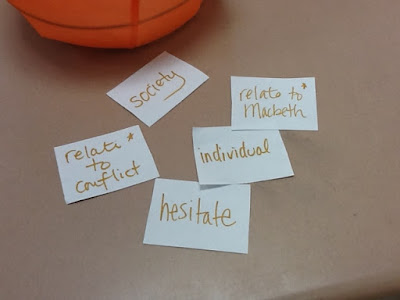First step: we have to start with the questions.
First goals for my students:
- craft a question that connected the two books they read
- revise the question as needed
- share it with classmates
I wanted students talking to each other, and moving around. So, I made up a version of Bingo that would use the game to achieve my goals and their social learning.
 First, on a piece of paper, they made a bingo board (a big one, that they could write in the boxes of).
First, on a piece of paper, they made a bingo board (a big one, that they could write in the boxes of).
Then, they filled the center square with their own question.
We took about 10-15 minutes and they filled the rest of their board with their classmates' questions.
 While they were conversing, I eavesdropped for key words in their questions and wrote them down on cards.
While they were conversing, I eavesdropped for key words in their questions and wrote them down on cards.While listening in, I heard students revise awkward wording, clarify vocabulary, expand and condense their questions. The repetition created a natural space for revision, because if they didn't like the sound of it, they made it better. This was more effective than requiring a set number of revisions, because some had a powerfully clear question to start.
When everyone had their boards, I tweaked the typical Bingo rules. I drew words from the bag (the key words I had written down) and to 'get' a square, students had to either answer a question with that word in it, or use the word to answer a different question.
For example, if I chose 'society' they had to either answer a question that already incorporated 'society' or use 'society' in their answer to any other question.
For example, if I chose 'society' they had to either answer a question that already incorporated 'society' or use 'society' in their answer to any other question.
For A Period, Jack won and read out his questions and one sentence answers. If we had more time, we would have played to have a cross on the board, or to blackout.
These one-sentence statements could all be used as thesis statements, so all of my students were equipped to go into their weekend homework not only influenced by the thoughts of others, but with 25 questions and five possible answers.
These one-sentence statements could all be used as thesis statements, so all of my students were equipped to go into their weekend homework not only influenced by the thoughts of others, but with 25 questions and five possible answers.






No comments:
Post a Comment